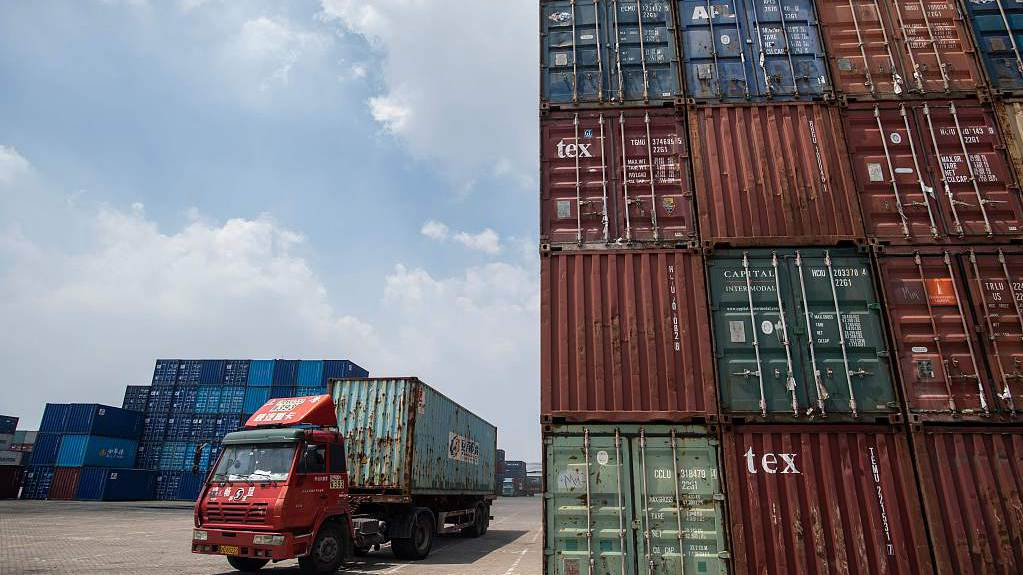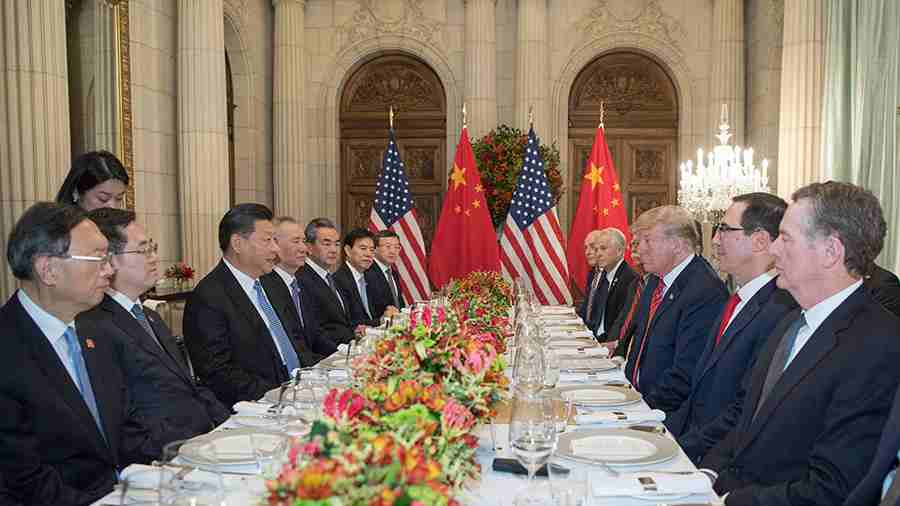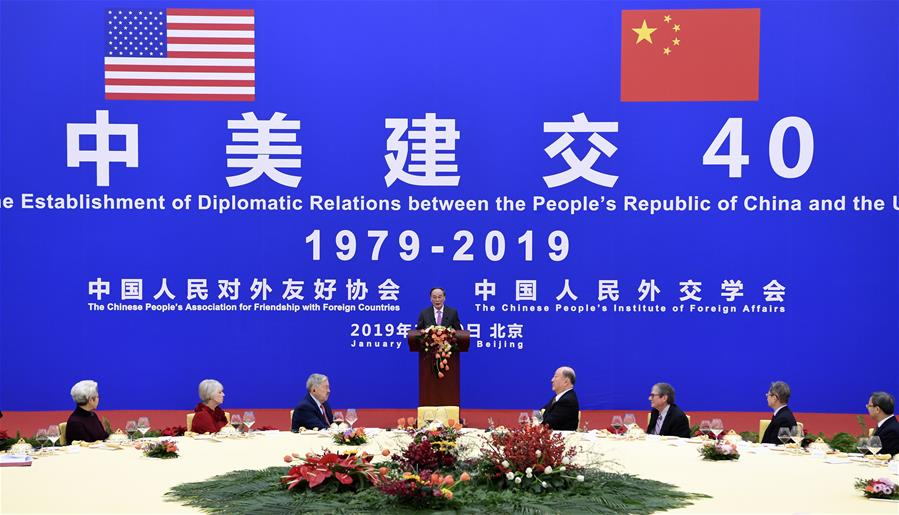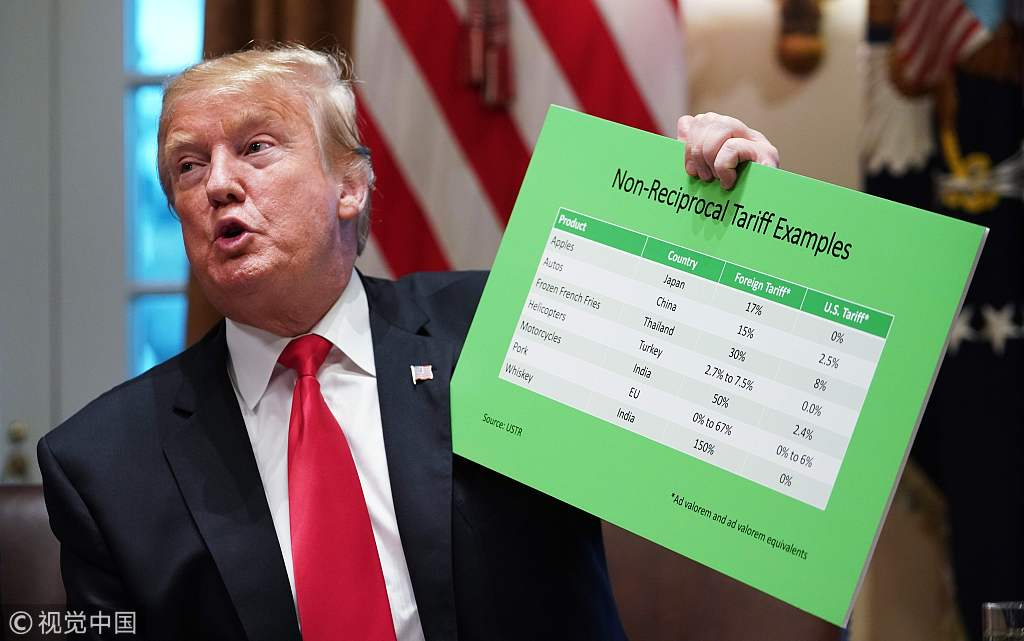
Opinion
17:32, 31-Jan-2019
Opinion: What should we expect from the seventh round of China-U.S. trade talks?
Li Yong

Editor's note: Li Yong is a current affairs commentator and senior fellow at the China Association of International Trade. The article reflects the author's opinion, and not necessarily the views of CGTN.
A Chinese delegation led by Chinese vice premier Liu He, started the seventh round of trade talks with the U.S. side in Washington on January 30.
The negotiations seemed to have kicked off on an optimistic note with the White House sending a welcome message to the Chinese delegation upon their arrival.
The previous six rounds of talks between the two largest economies ended without any meaningful agreements, and tariffs were levied by both sides beginning from last July on selected goods. The tariffs have produced undesired consequences for both sides.
At the meeting between Chinese President Xi Jinping and U.S. President Donald Trump at the G20 meeting in Buenos Aires, Argentina, on December 1, 2018, a new consensus was reached by the two top leaders on fresh efforts to negotiate for solutions to the trade disputes within 90 days.

Chinese President Xi Jinping speaks during a working dinner with his U.S. counterpart Donald Trump in Buenos Aires, Argentina, December 1, 2018. /Xinhua Photo
Chinese President Xi Jinping speaks during a working dinner with his U.S. counterpart Donald Trump in Buenos Aires, Argentina, December 1, 2018. /Xinhua Photo
No details with regard to the early arrival of the Chinese trade delegation have been disclosed, but their appearance in Washington two days before the start of the talks should at least be seen as a sign of goodwill from the Chinese side.
That goodwill seemed to have received a “reciprocal” reaction from the U.S. side. Both White House spokesperson Sarah Sanders and Treasury Secretary Steven Munchin announced on Monday that President Trump will meet Liu He during the week of talks, which is quite unusual. President Trump initiated a surprise meeting with Liu He last May when both sides were in the third round of talks in Washington.
China is serious in pushing for a resolution
On the Chinese side, the agreement between the two top leaders in Buenos Aires served as the basis of follow-up actions, which led up to the vice-ministerial level and widely regarded as preparatory for a higher level of negotiations.
Talks at that level were supposed to last for two days – January 7-8, but were unexpectedly extended for half a day in a development widely seen as a positive sign of mutual engagement in pushing for a pragmatic solution. Vice Premier Liu He's attendance at the meeting was a pleasant surprise for U.S. officials, and once again confirmed China's commitment to resolving the trade disputes.
Since the meeting between the top leaders of the two countries, China's vice president Wang Qishan has made positive comments on China-U.S. economic and trade relations in two of his public appearances. Wang is an old hand of China-U.S. relations and a top aide of President Xi Jinping. His involvement in sending signals elevated the level of attention on the China-U.S. economic and trade issues by the top leadership.
On January 10, Wang attended the reception marking the 40th anniversary of the establishment of diplomatic relations between China and the United States in the Great Hall of the People in Beijing. In his speech, Wang stressed that China and the United States should respect each other's sovereignty, security and development interests and properly handle and control differences through dialogue and consultations, seen as key to the healthy and stable development of bilateral relations. He urged both countries to “take a restart.”

Chinese Vice President Wang Qishan addresses a reception marking the 40th anniversary of the establishment of diplomatic relations between China and the United States in the Great Hall of the People in Beijing, China, January 10, 2019. /Xinhua Photo
Chinese Vice President Wang Qishan addresses a reception marking the 40th anniversary of the establishment of diplomatic relations between China and the United States in the Great Hall of the People in Beijing, China, January 10, 2019. /Xinhua Photo
In his interactions with the audience after his speech at Davos World Economic Forum on January 23, Wang expressed his optimism about the China-U.S. economic and trade relations saying that the economies of China and the U.S. could not be separated, and “this is already an established reality, and the conclusion is: mutually beneficial win-win cooperation is the right direction and cooperation will benefit both sides, while confrontation hurt both sides.”
China put forward a list of offers in November last year, which the WSJ reported includes 142 items. The gaps are narrowing and more than 80 percent of them could be done, according to media analysis.
The ball is in the U.S. court
On the U.S. side, the messages have been mixed. President Trump spoke highly of his meeting with President Xi in the G20 meeting in Argentina. He tweeted on December 5, “Very strong signals being sent by China once they returned home from their long trip, including stops, from Argentina. Not to sound naive or anything, but I believe President Xi meant every word of what he said at our long and hopefully historic meeting. ALL subjects discussed! “
On the mid-level talks in Beijing, President Trump said on Jan.8 in a message on Twitter that the talks were “going very well,” a sign that the preparatory meetings were at least moving in what he considered the right direction. Commerce Secretary Wilbur Ross, however, made a skeptical comment a week before the planned negotiations, saying that both are still “miles and miles” away from reaching an agreement. But he added that "there's a fair chance we do get to a deal."

U.S. President Donald Trump holds a tariff table as he speaks in the Cabinet Room of the White House on January 24, 2019. /VCG Photo
U.S. President Donald Trump holds a tariff table as he speaks in the Cabinet Room of the White House on January 24, 2019. /VCG Photo
Treasury Secretary Steven Mnuchin identified three issues of critical importance when he spoke on Monday at a White House news conference, saying “IP [intellectual property] protection, no more forced joint ventures, and enforcement are three of the most important issues on the agenda."
The first two will be properly addressed in the negotiations, as they have already become part of China's reform measures being taken. Enforcement should not be an issue as well, but ongoing verifications as the U.S. has demanded might be. It is more of a technical issue that should not pose a major hurdle for both sides to reach some agreements.
China is putting maximum efforts into striking a deal, while the U.S. side is still pursuing an agreement with divided opinions among themselves. Agreements or agreements with disagreements really depend on how the U.S. is going to manage their own internal divisions and differences.
(If you want to contribute and have specific expertise, please contact us at opinions@cgtn.com)

SITEMAP
Copyright © 2018 CGTN. Beijing ICP prepared NO.16065310-3
Copyright © 2018 CGTN. Beijing ICP prepared NO.16065310-3